Luis J. Rodriguez has emerged as one of the leading Chicano writers in the country with ten nationally published books in memoir, fiction, nonfiction, children’s literature, and poetry. Luis’ poetry has won a Poetry Center Book Award, a PEN Josephine Miles Literary Award, and “Foreword” magazine’s Silver Book Award, among others. His two children’s books have won a Patterson Young Adult Book Award, two “Skipping Stones” Honor Award, and a Parent’s Choice Book Award, among others. A novel, Music of the Mill, was published in the spring of 2005 by Rayo/HarperCollins; a poetry collection, My Nature is Hunger: New & Selected Poems, 1989-2004, came out in the fall of 2005 from Curbstone Press/Rattle Edition.
Luis is best known for the 1993 memoir of gang life, Always Running: La Vida Loca, Gang Days in L.A. An international best seller—with more than 20 printings, around 250,000 copies sold—the memoir also garnered a Carl Sandburg Literary Award, a Chicago Sun-Times Book Award, and was designated a New York Times Notable Book. Written as a cautionary tale for Luis’ then 15-year-old son Ramiro—who had joined a Chicago gang—the memoir is popular among youth and teachers. Despite this, the American Library Association in 1999 called Always Running one of the 100 most censored books in the United States. Efforts to remove his books from public school libraries and reading lists have occurred in Illinois, Michigan, Texas, and more recently in California, where the battles were quite heated.
Yet for all the controversy, Luis has gained the respect of the literary community. In addition to the above honors, he has received a Sundance Institute Art Writers Fellowship, a Lila Wallace-Reader’s Digest Writers’ Award, a Lannan Fellowship for Poetry, an Hispanic Heritage Award for Literature, a National Association for Poetry Therapy Public Service Award, a California Arts Council Fellowship, an Illinois Author of the Year Award, several Illinois Arts Council fellowships, the 2001Premio Fronterizo, and “Unsung Heroes of Compassion” Award, presented by His Holiness the Dalai Lama.
Luis is also known for helping start a number of prominent organizations—such as Chicago’s Guild Complex, one of the largest literary arts organizations in the Midwest, and the publishing house of Tia Chucha Press. He is also one of the founders of Youth Struggling for Survival, a Chicago-based not-for-profit community group working with gang and nongang youth. He helped start Rock A Mole (rhymes with guacamole) Productions, which produces music/arts festivals, CDs, and film in Los Angeles. And he is a cofounder of Tia Chucha’s Café & Centro Cultural—a bookstore, coffee shop, performance space, art gallery, and workshop center that opened in December 2001 in the Northeast San Fernando Valley.
On top of this, Luis has spent some twenty five years conducting workshops, readings, and talks in prisons, juvenile facilities, homeless shelters, migrant camps, universities, public and private schools, conferences, Native American reservations, and men’s retreats throughout the United States. He has also traveled to Canada, Europe, Mexico, Central America, and Puerto Rico doing similar work among disaffected populations. In addition, he’s editor of the new Chicano online magazine, Xispas.com.
Luis has been part of the Mosaic Multicultural Foundation’s Men’s Conferences since 1994 with Mosaic founder Michael Meade, healer Orland Bishop, West African teacher-elder Malidoma Somé and American Buddhist Jack Kornfield. At these conferences, the complex but vital issues of race, class, gender, and personal rage are addressed with dialogue, ritual, story, poetry, and art involving men of all walks of life, including those in urban street gangs. He also created a CD of original music and his poems called “My Name’s Not Rodriguez” for Dos Manos Records, released in the summer of 2002.
Luis’ work has also been widely anthologized, including in Letters of a Nation: A Collection of Extraordinary American Letters (1997 Broadway Books/Kodansha American), and most recently in the Outlaw Bible of American Poetry (1999 Thunder’s Mouth Press) and Bum Rush the Page: A Def Poetry Jam (2001 Three Rivers Press). His poems and articles have appeared in college and high school textbooks throughout the United States and Europe. He has done radio productions and writing for LA’s KPFK-FM, California Public Radio as well as Chicago’s WMAQ-AM’s All-News radio and WBEZ-FM. And his writings have appeared over the last twenty-five years in The Nation, New York Times, Los Angeles Times, Chicago Tribune, U.S. News & World Report, LA Weekly, Philadelphia Inquirer Magazine, American Poetry Review, San Jose Mercury, Grand Street, Utne Reader, Prison Life, Progressive Magazine, Rock & Rap Confidential, among others. In 2005, he was asked to become a contributing writer to the LA Times' “West” magazine.
xxxxxxxxxxxxxxxxxxxxxxxxxxxxxx
For those people not in the loop, recap for us the recent changes that you and Tia Chucha Cultural Center have faced?In February, we were forced to move out of our space in Sylmar, CA (in the Northeast San Fernando Valley -- the second largest Mexican community in Los Angeles) when the landlords almost tripled our rent--they wanted to bring in a multi-million dollar laundry services. This was a terrible setback--we had been in that space for over five years and had amazing events there. We were also the only bookstore and cultural space for the 500,000 people who live in the Northeast San Fernando Valley. However, we did not give up. Our last event in the old space became a major fundraiser--we raised $10,000 and around 600 people showed up that day.
We also found a new place in Lake View Terrace, about 10 minutes from our old location. We are now fully operational with workshops, regular events, and author readings. We have also maintained the bookstore and Tia Chucha Press. Unfortunately, the new space is much smaller and we don't have our cafe. However, we are in negotiations with the city and developers--as part of a Community Benefits Agreement--to try and get a new Tia Chucha's in the barrio of Pacoima. Even if we succeed, it will be three to four years down the line--but it will also be a much bigger, better, and more permanent Tia Chucha's. Our major fundraiser for the year will be held on July 29 from 6 to 8 PM at the Ford Amphitheater in Hollywood. We plan to fill the 1200 seats of this theater. For more information and to obtain tickets, please go to
www.tiachucha.com.How would you describe the significance of the Center in regard to Latino literacy, community access to the arts, and visibility for Latino arts in the current anti-immigrant climate.We are losing neighborhood arts spaces throughout the LA area--and in most major cities of the country. LA is concentrating the arts west of downtown, Hollywood and certain gallery districts. But in most local neighborhoods, especially in poor Mexican and African American communities, there are no bookstores, art galleries, or cultural spaces. Tia Chucha's was an important contribution to bringing the arts back to the barrio, to the neighborhood, to areas that are rife with poverty, gangs, drugs, and unemployment. We have found that the arts--music, painting, dance, theater, film, writing, and more--are vital to community spirit, economic development, and social health. This is why we have decided to continue our mission and to find a larger space for our programming, books, and workshops. In particular, we have created a space where immigrants can feel at home, can gain skills and knowledge, and can express themselves. Our Noche Bohemias, a weekly mostly Spanish-speaking open mic for guitarists, poets, and singers, is one of our most popular evenings at Tia Chucha's. And our dialogues and films on the issues of the day help bring consciousness and strategic awareness to this vulnerable and repeatedly attacked community.
Speaking of the term currently in use, 'anti-immigrant,' I personally feel it's code for 'anti-Mexican.' I don't see a groundswell of media coverage, for example on Polish, Irish or Serbian immigrants without papers. Could you comment?Yes, it's based on the fact that Mexicans are the heart of the least paid and most exploited sections of the working class in this country. Mexicans have come to this country due to the dire poverty and hunger in Mexico. People don't realize that the GNP of Los Angeles is greater than all of Mexico. That the 10 million Mexican nationals in the US make more money than all of the 100 million still in Mexico. The fact we are people of color--mostly indigenous to this land--and that we have a long history of conquest and colonialism with the US also informs our special status among immigrants today. This is not to say that other immigrants won't be affected by any upcoming immigration law, or that they are not organizing and protesting the anti-immigrant sentiments and actions along with Mexicans. We all benefit if a humane, holistic, and truly encompassing immigration policy gets enacted in this country. Right now, neither the Democrats or Republicans know what to do with this issue. We're going to need the help of other immigrants, and citizens as well, if we are to move beyond the narrow-minded, xenophobic, anti-Mexican hysteria gripping parts of this country and some lawmakers.
You have a long history focusing on youth, youth in the arts, etc. What is your take on the artist's role concerning the lack of options for our young people? What response do you feel is necessary, given that lack and the ever-present recruitment of our young men and women into the military?The arts are the most effective and meaningful way to deal with violence, alienation, disaffection, and a lack of hope--these are all plaguing young people today. While I don't have a gang-focus program at Tia Chucha's, I know that we are helping many gang (and much more nongang) youth. They find books they cannot get anywhere else. They get to see films, participate in dialogues, obtain skills in all the arts and various media, express themselves in Open Mics and other outlets at Tia Chucha's. This empowers them. It allows them to tap into the inexhaustible creative power they all possess. It helps them see themselves as agents of change with the power to shape their own destinies and futures. We need more imaginative options for young people. Too many of them join gangs, get into drugs, or join the military because there are few other choices to make. We need real resources and real relationships to help young people become what they are capable of becoming--the greatest resource for change, justice, and real peace we have today.
You and I are both at midlife. How has that influenced your world view, your priorities? Describe its impact on you not only as a writer and activist, but as a family man.I have learned to value learning and change in my life. Too many of us "olders" don't get to become elders because we have become stuck with emotional, psychological, and social baggage. I feel I am entering a phase of my life that requires that I give back, that I teach, that I help others to summarize their lives and get organized.
It's not so much about what "I" need to get (whether in my career or personal life), but in the things I do and say, how I can help strengthen, guide, and positively contribute to my community. I learned, for example, to become sober after seven years of drug use and 20 years of drinking (I've been sober now for 14 years). I've learned to be a better father, especially to my youngest sons, but also with my oldest kids who suffered a lot due to my own fears, uncertainties, and failures. I don't do anything that pulls me away from family, yet I'm still quite active in the world. These have to complement and enhance each other, not take away and undermine. My writing as also changed--a lot more reflective and also conscious. I'm painfully aware of how much I can teach from my work, my actions, and my inactions.
The body of your writing, including your most recent works, Music of the Mill and My Nature is Hunger, you clearly connect with and honor not only Latindad, but working class people as well. What has it meant for you to write about the strengths, the losses and perseverance and the places where we stumble and fall?
For one thing, you still don't get to see these aspects of our culture--the Latino reality and the working class reality--in the mainstream culture. We are still "peripheral" to most film, literature, TV, radio, music, and similar outlets, although in reality we number in the millions and are part and parcel of most cities, most states, and most communities.
I feel this is also part of my contribution--to tell those stories that have not been told, or perhaps cannot be told due to what amounts to economic and social censorship, if not exactly censorship by law (more defacto than de jure). It's also important to point out that Latinos have many things that unite them, but they are also distinctly different, of all races and classes, with myriad interests. I find it hard to demand a unity with "all" Latinos unless it's clear what we mean. I love Puerto Ricans, Cubans, Colombians, Salvadorans, Guatemalans, and others. But they are not Mexicans. And in Mexico, there are differences depending on what state or region one came from. I also found it interesting how different Mexicans in Chicago are from those in LA. Yes, we have many things, essential things, that can unite us. And we should do that. But this should not mean that we homogenize and lose our unique flavors, tongues, expressions, and traditions.
What are some practical ways our readers can support the work of Tia Chucha?We need people's donations and active participation. We want people to come to Tia Chucha's, to partake in the amazing workshops and events we have for the community, and to attend our outside events like the "Celebrating Words" literacy & arts festival that we hold every year in Sylmar Park--and our annual benefit event at the Ford Amphitheater in Hollywood. We need financial assistance from all over. We also hope in a few years to establish a Tia Chucha's in Chicago--we've been talking to people about this for a while now. And we need volunteers. Anyone in the LA area can help in this regard. Although Tia Chucha's started as a private business by my wife, a brother-in-law, and myself, we are now a 501 (c) 3 tax exempt non-profit organization. All funds, even through the bookstore and cafe, help us meet our mission, goals, and objectives to bring the arts to all ages in the Northeast Valley and the LA area.
Describe where you'd like to see yourself and Tia Chucha ten years from now.I'm working on several new books, including new poetry, new fiction, and perhaps another memoir. I'm also working on a possible movie of Always Running. I hope this truly happens, although I want to make sure the authenticity and integrity of the story and people are intact. I would also like to consider some other film and stage possibilities. As for Tia Chucha's, I hope we can re-establish in Pacoima--the main barrio in the Northeast San Fernando Valley (and one of the poorest communities in LA County), but to also have one in Chicago, East LA, and perhaps some other locations. Tia Chucha's is a uniquely powerful concept that works. I'd like to help other communities achieve the same whenever possible.
And I must say, I pray that my family remains well and healthy in the years to come. My son Ramiro, who has served 10 years in the Illinois Department of Corrections, will be out in four more years. I want him to be strong, safe, and out of the destructive life he was living into a healthy, wholesome, and satisfactory socially engaged and active one. I also hope I lose my unhealthy weight and stay in good shape for the long haul--I know I have so much to do, and not much time to do it all. I'm working hard now to eat right, exercise, and have a strong spiritual life for such a future.
What's something not in the official bio?I'm now juggling work among gang youth and mentorship, including the shaping of urban peace policy, with my work in the arts; my own writing, stage, and film work; with family; and other community commitments. I've learned how to do this in a way that keeps me balanced and centered. I'm also in a strong sweat lodge circle in the Northeast Valley--something my wife. Trini, and I have been involved with since we lived in Chicago. We also do annual trips to the Navajo reservation for ceremonies (my family was adopted by a Navajo elder there many years ago), and we've added trips to sacred places like Peru to continue our spiritual growth and healing.
On top of all that I'm doing, I'm still editor of Tia Chucha Press--creating wonderful poetry collections for more than 18 years now. I'm also editor/founder of Xispas magazine, an online Chicano magazine. And I'm a regular columnist for the Progressive magazine, out of Madison, Wisconsin.
People may also not know that besides my four children (ages 32, 30, 19, and 13), I have four grandchildren, including two who are already teenagers--and older than my youngest son. I'm extremely busy, which means I don't get a chance to respond to the countless letters and emails in support of my work. For this I apologize. But I appreciate all the positive messages and stories. I may be in the middle of my life now, but things seem more vital and regenerating than I could have ever imagined.
Gracias.
No, Luis,
gracias a ti.
Music of the Mill
ISBN-10: 0060560770
My Nature Is Hunger
ISBN-10: 1931896240
Lisa Alvarado



























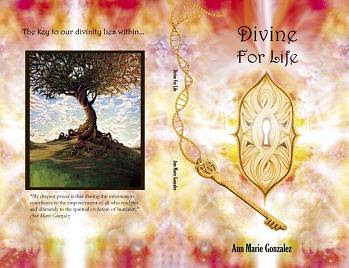


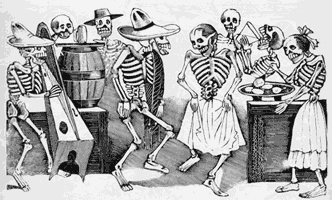
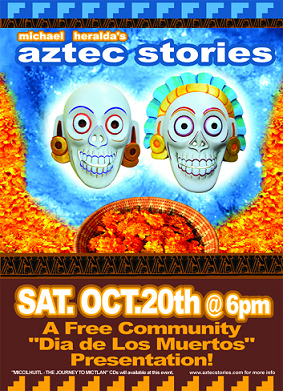
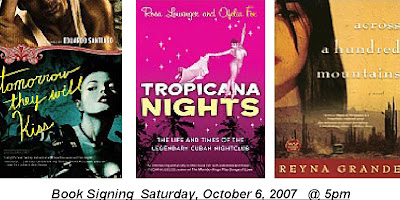

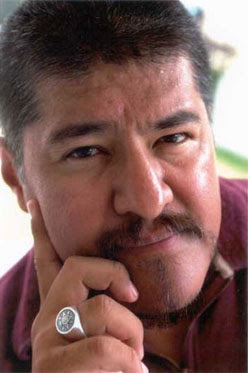


I got your site from another site and I am happy to get it as you have really well maintained blog here and I really liked your posts.
I was very impressed with Luis's presentation on the 29th. I really loved how he spent so much time addressing the questions of the crowd and not just saving all of the time to talk about his books. He talked about so many pertinent issues with today's youth. What he is doing for communities especially in California is very honorable. After listening to this lecture I can't wait to read one of his books!
Xánath's post about Luis's visit to KC right on targeting Luis's keen observations and recommendations for youth to connect with their passion and their art (whatever that art may be). We were all impressed by Luis's unassuming brilliance.
Thanks to all for the tremendous feature on Luis today! His organization deserves all and more...
'brazos Luis y todos,
Gloria Martinez Adams
Luis' talk was captivating. His use of imagery to capture the essence of the poem's subject is unrivaled.
The way Luiz openly shared his life's story was amazing. Despite all of the bad decisions he had made throughout his life, both dangerous and illegal, he has still managed to turn his life around. In his struggle to leave 'the vida loca' Luis was able to overcome addiction, poverty, violence and gang life. He is an inspiration to anyone going through a rough time in their life. It is never too late to make a change in your life.
Thank your for sharing the experience of Luis J Rodriguez for those of us who could not attend. Adelante, LWC! -- Juanita
Thank you all for you comments. It's a pleasure and an honor to publish these words in La Bloga.
Peace,
Xánath Caraza
My name is Romney Hartsfield. I was thoroughly impressed by Mr. Rodriguez's poems he shared. Being that english was not his primary languageand the fact that he was involved in a gang made me even more excited about reading his book. So I bought the book and read it over the weekend. The book was quite entertaining and informative. I look forward to future readings from him.